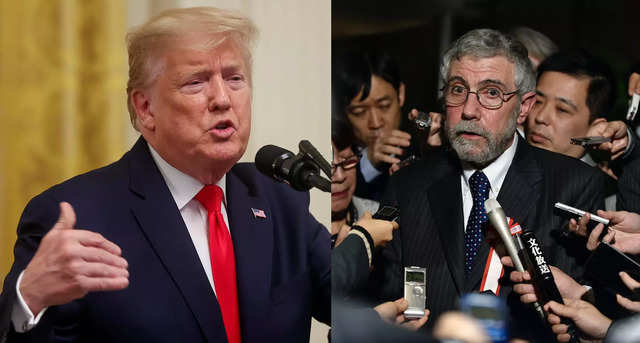REUTERS/Jonathan Ernst, REUTERS/Franck Robichon
- Trump’s policies could leave the US economy with two major challenges, Paul Krugman said.
- Krugman pointed to Trump’s economic plan, which economists have described as inflationary.
- Trump’s deportation plans could also hit the economy, given that immigration has boosted the job market.
The US could be in for twin shocks if Trump becomes president for a second time, Nobel economist Paul Krugman said.
The Nobel economist pointed in particular to the former president’s plan to raise tariffs on virtually all imported goods, as well as his plan to carry out the “largest deportation in the history of our country.”
Those two policies could have big consequences for the US, Krugman said. Trump’s tariff plan — which includes up to 20% tariffs on all imports, and a 60% tariff on Chinese goods — is largely expected to raise prices, with most of the burden falling on the bottom 80% of Americans, according to an analysis from the Peterson Institute for International Economics.
Trump’s general economic plan is also widely thought to be more inflationary than Harris’s. A survey conducted by the Financial Times and the University of Chicago showed that 70% of polled economists believed Trump’s economic plan would put more upward pressure on prices than Harris’s, Krugman noted.
“The tariff issue is enormous. We’re talking about a radical break not just with recent economic policy, but a radical break with 90 years of US support for … increased trade. We’re talking about an inflationary shock that is bigger than almost anything else that you could do through federal policy,” Krugman said.
Experts have also taken issue with Trump’s plans to ramp up deportation. A one-time operation to remove the 13 million undocumented immigrants living in the US would cost at least $315 billion, with the total cost over the next decade likely mounting to $968 billion, according to an analysis from the American Immigration Council.
Previously, Krugman also made the case that immigration provides a huge boost to the economy and the job market. That’s because immigrant workers add to the supply of labor, help raise wage growth, and possibly even help keep a lid on inflation, he wrote in an op-ed for the New York Times.
“So the tariff thing, and when you combine that again with mass deportation, those are really, really big negative shocks to the economy,” he added.
That differs from the view some Americans have, most of whom rate Trump over Harris on economic issues. In a recent Wall Street Journal poll, over 50% of surveyed voters said Trump was “best able to handle” the economy, compared to around 40% of voters who said Harris was more able.
“Different polls are giving you different stories here,” Krugman said. “The economists, both academic and business economists, are overwhelmingly of the opinion that Trump will be much worse for the economy, especially on inflation.”
The economy remains on strong footing, with inflation having cooled dramatically from its highs and edging closer to the Fed’s 2% price target. One-year inflation expectations were 3%, according to the New York Fed’s latest survey of consumer expectations.
